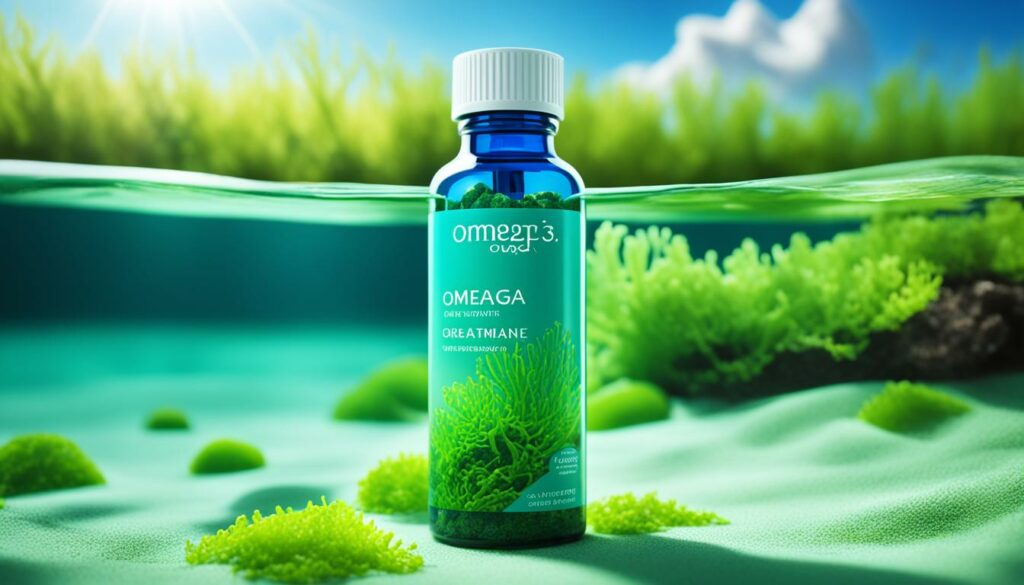Omega-3 fatty acids are essential for great health. Yet, cod liver oil and fish oil aren’t the only ways to get them. Let’s look at alternatives to cod liver oil and fish oil. We’ll see natural supplements, plant-based omega-3 sources, vegan omega-3 options, and sustainable omega-3 alternatives. Marine algae supplements, flaxseed oil, chia seeds, and walnuts offer new paths to nourish our bodies. This leads to a healthier and more balanced life.
Key Takeaways
- Natural supplements provide fresh alternatives to fish-based omega-3s.
- Plant-based sources bring omega-3s to vegans and those with dietary needs.
- Marine algae supplements offer needed fatty acids with less environmental impact.
- Flaxseed oil, chia seeds, and walnuts are nutritious and easy to add to meals.
- Knowing various omega-3 sources allows for tailored and efficient health strategies.
- Talking to healthcare providers ensures supplements are safe and fit personal needs.
Understanding Cod Liver Oil and Its Nutritional Impacts
Cod liver oil is a long-time favorite natural supplement, known for its cod liver oil nutritional benefits. It’s packed with omega-3 fatty acids, which are great for heart health, brain function, and reducing inflammation.
Key Nutrients in Cod Liver Oil
A teaspoon of cod liver oil gives you a lot of omega-3s. It also provides 150% of the Daily Value (DV) for vitamin A and 56% of the DV for vitamin D. These are key for good vision, a strong immune system, and healthy bones.
Moreover, it includes vitamin K-2, which is important for bones and the heart. The oil has about 4.5 grams of total fats. This includes 2.1 grams of monounsaturated fat, 1 gram of saturated fat, and 1 gram of polyunsaturated fat.
Common Challenges with Cod Liver Oil Consumption
But, taking cod liver oil can sometimes be hard. Some people might not like its taste or smell, and it can upset the stomach. It also needs to be stored right to keep it working well and safe.

Health Concerns: Oxidation and Potential Toxins
There’s also a worry about oxidation and toxins in cod liver oil. Oxidation can make the oil go bad when exposed to light, heat, or air. Plus, toxins from the ocean can get into the oil, making it unsafe.
So, it’s very important to pick high-quality cod liver oil from trusted suppliers. This helps ensure it’s safe and keeps its health benefits.
Cod liver oil is still a great source of nutrients. But being careful with what you choose and how you use it is key. This helps you get the most out of it while avoiding any risks.
Alternatives to Cod Liver Oil and Fish Oil
Omega-3 fatty acids are essential for our health. So, finding alternatives to cod liver oil and fish oil is key for those with different needs. Whether due to diet, the environment, or personal taste, there are many natural supplements and plant-based omega-3 sources. Let’s explore the healthiest options out there.
For vegan omega-3 options, there’s good news. Many plant-based foods are rich in omega-3s. Chia seeds, flaxseed, seaweed, algae, hemp seeds, and walnuts are not only rich in omega-3; they’re also important for a balanced diet. Omega-3s from algal oil are similar to those from salmon. They provide about 100–300 mg of DHA per serving.
Krill oil is another option to consider. While it has less omega-3 per serving than fish oil, it has lower mercury levels. It also doesn’t have major side effects. This makes krill oil a strong alternative to cod liver oil and fish oil. Krill oil supplements are red, unlike the usual yellow or gold of fish oil.
| Supplement Type | Omega-3 Content | Additional Benefits | Considerations |
|---|---|---|---|
| Fish Oil | 300 to 2,200 mg per serving | Supports cardiovascular health, reduces inflammation | May contain vitamin A, potential for oxidation |
| Krill Oil | 45 to 200 mg per serving | Less mercury, fewer side effects | Recommended avoidance during pregnancy |
| Algal Oil | 100–300 mg of DHA | Similar bioavailability to fish, vegan-friendly | Fits plant-based diets, environmentally sustainable |
Some studies highlight that omega-3 supplements may cause mild side effects. These include stomach pain and belching. Fish oil can improve heart health and stabilize lesions in the arteries. However, high doses might lower immune function by reducing inflammation.
Omega-3s are also vital during pregnancy. They’re linked to better memory in school-aged children. Thus, including natural supplements in a balanced diet is crucial. This is important for lasting health and happiness. A well-rounded diet usually provides enough omega-3s. This shows that supplements are helpful but not essential.
Understanding the alternatives to cod liver oil and fish oil is crucial. This knowledge lets us make choices that fit our health needs, diets, and values. It guides us to the best options for our wellness.
Sustainable Omega-3 Sources Beyond Fish
Omega-3 fatty acids are key for a healthy heart. But, overfishing and aquaculture’s environmental impact urge us to find sustainable omega-3 sources. Marine algae and plant-based omega-3s are eco-friendly alternatives. They offer great health and environmental benefits.
Marine Algae: A Direct Source of Essential Fatty Acids
Marine algae supplements are a top choice, providing EPA and DHA directly. The conversion of ALA to EPA and DHA in our bodies is less than 15%. So, these supplements are extra beneficial. They come straight from microalgae, bypassing fish. This makes them good for our bodies and the planet.

Eco-Friendly Choices: How Alternatives Impact the Environment
Plant-based omega-3 options and marine algae supplements are better for the ocean than fish oil. Farm-raised fish are losing their EPA and DHA because of unsustainable feed. Algae, on the other hand, doesn’t harm marine life or pollute the water. It’s a steady and green omega-3 source.
| Nutrient | Plant-based Sources | Marine Sources | Recommended Intakes |
|---|---|---|---|
| ALA | Flaxseeds, Chia Seeds, Walnuts | Grass-fed Beef | AIs vary by age/gender |
| EPA/DHA | Marine Algae Supplements | Sardines, Salmon, Tuna | ≥ 3 g/day (therapeutic) |
We absorb about 95% of omega-3s from our food. But, the source matters a lot. Plant and algae-based omega-3s don’t rely on fishing. This way, we can keep them sustainable and reduce environmental harm.
Shifting to sustainable omega-3 sources is becoming popular, like in DHA-fortified infant formulas. Using eco-friendly alternatives, we protect our health and the ocean’s creatures.
The Role of Plant-Based Supplements in Nutrition
The market for dietary supplements is booming. The cod liver oil market hit USD 82.29 million in 2021. It’s expected to reach USD 162.86 million by 2029. This growth, with a 9.06% CAGR, shows how nutrition matters to people everywhere. Today, plant-based supplements are gaining popularity. They are strong natural alternatives to options like cod liver oil. In essential fatty acids, especially vegan omega-3 sources, the shift is clear.
The move to plant-based nutrition is supported by strong numbers. In the U.S., supplement sales rose by 14.5% in 2020. This increase highlights the growing focus on health. Specialty supplements, such as prebiotics, probiotics, and omega-3s, grew by 12.0% from 2019 to 2020.
In the U.K., over 71% of adults use dietary supplements. This shows a big interest in boosting health. British supplement use among all ages rose by 19% since 2019. It shows how important additional nutrition is in everyday life.
Research backs the benefits of plant-based supplement options. A 2017 study by Miyata and Moradi’s 2022 research show their positive effects. These include reducing chemo side effects and controlling appetite. Clearly, adding plant-based supplements to the diet has proven advantages.
- Scientific Research: Recent studies found benefits like aloe vera gel reducing radiation skin damage (Tungkasamit et al., 2022). Plants like Echinacea angustifolia can ease anxiety (Lopresti and Smith, 2021).
- Phytochemical Characterization: Studies, for instance by Natic et al. in 2019, help us understand more about the benefits of wild fruits. These include increasing the range of vegan omega-3 sources and other nutrients.
- Herbal Nutraceuticals: Reviews from Lokhande et al. (2018) and Chauhan et al. (2013) look into the health benefits of plant-based nutraceuticals. They show a wide range of biological activities.
In 2021, Europe led the market with USD 37.57 million in sales. Every continent is seeing the rise in these health supplements. North America is also gaining a large part of this market. This reflects a worldwide trust in plant-based supplements.
The soft gels form of plant supplements is very popular due to its ease and taste. But the demand is growing, and so are the options. This variation helps meet different needs. It lets us get the full benefits of plant-based nutrition.
Conclusion
We’ve learned that there are many alternatives to cod liver oil and fish oil. This is good news for those who avoid fish oil due to diet, taste, or environmental reasons. Natural supplements are a great choice. They’re good for your health without harming the planet. Plant-based omega-3 sources show how diverse and beneficial nature’s nutrients can be.
Studies from top journals show the health benefits of omega-3s, like better heart health and lower death risks. But, too much fish oil, such as cod liver oil, might increase the risk of osteoporosis. It’s important to choose omega-3 supplements carefully, considering what’s best for your health.
Omega-3 benefits are wide-ranging, from reducing inflammation to supporting the heart. Adding fish oil or vegan omega-3s to your diet can boost your health. Doing so helps your heart, brain, and overall body balance. This way, we take care of our health and the environment too.
FAQ
What are the key nutrients found in cod liver oil?
Cod liver oil is packed with omega-3 fatty acids. It also has vitamins A, D, and K-2.
What are some common challenges with consuming cod liver oil?
People often struggle with its taste, smell, and sometimes, it can upset your stomach.
Are there any health concerns associated with cod liver oil?
Yes, oxidation and toxins in cod liver oil can be a worry for some.
What are some alternatives to cod liver oil and fish oil?
You can try krill oil or desiccated liver capsules. High-vitamin butter oil and microalgae supplements are good too. Don’t forget about flaxseed oil, chia seeds, and walnuts.
What are sustainable options for obtaining omega-3 fatty acids?
Marine algae supplements are a great choice. They’re a direct, earth-friendly way to get those fatty acids.
How do alternatives to cod liver oil and fish oil impact the environment?
Choosing alternatives that are kind to our planet can lower the environmental toll of supplements.
What is the role of plant-based supplements in nutrition?
Plant-based supplements are super for providing vital nutrients. They give you omega-3s, vitamins, minerals, and antioxidants.
Source Links
- https://en.wikipedia.org/wiki/Fish_oil
- https://www.healthgrades.com/right-care/cholesterol/cod-liver-oil-vs-fish-oil
- https://www.healthline.com/nutrition/9-benefits-of-cod-liver-oil
- https://www.ncbi.nlm.nih.gov/pmc/articles/PMC6475735/
- https://www.medicalnewstoday.com/articles/40253
- https://www.verywellhealth.com/krill-vs-fish-oil-7092905
- https://ods.od.nih.gov/factsheets/Omega3FattyAcids-HealthProfessional/
- https://www.frontiersin.org/articles/10.3389/fnut.2023.1107475
- https://www.fortunebusinessinsights.com/industry-reports/cod-liver-oil-market-101468
- https://www.ncbi.nlm.nih.gov/pmc/articles/PMC9654660/
- https://www.peoplespharmacy.com/articles/fish-oil-fights
- https://www.andreanochiropractic.com/fish-oil




